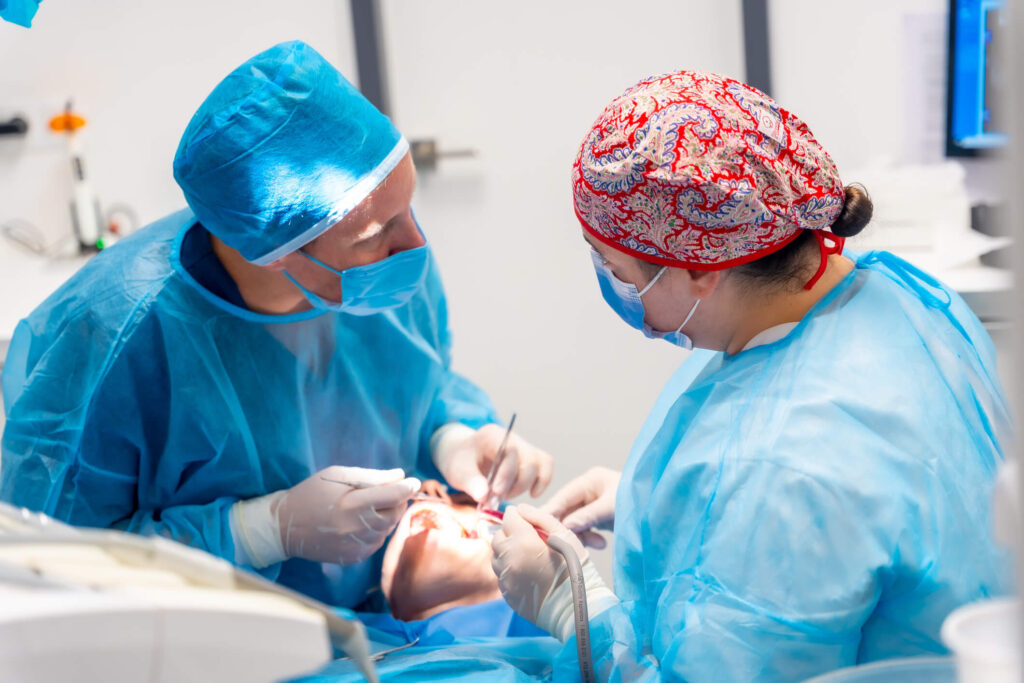Your oral health plays a crucial role in your overall well-being. Just as you would consult different specialists for varying health needs, the same applies to dental health. Both a general dentist and an oral surgeon are dental professionals who play essential roles in providing dental care for your oral health.
The core difference lies in their specialized training and the complexity of the procedures they handle. If you’re deciding between a general dentist or an oral surgeon, matching your specific oral health needs to the appropriate professional for the best care is essential.
Who Are General Dentists?
General dentists, also known as dental care providers, are responsible for patients of all ages’ primary oral health needs. They supervise general dental health and direct patients to specialists if needed. They perform routine dental care like cleanings, fluoride treatments, and preventive care instructions, and they also manage gum care to prevent gum diseases.
In addition, general dentists have the skills to carry out basic surgical procedures like teeth extraction, root canals, and dental restorations. This means they can handle common issues like cavities or minor tooth damage. They receive extensive training and education at undergraduate and accredited dental schools, allowing them to deal with minor dental surgeries efficiently.
What Procedures Do General Dentists Perform?
- Restorative Services. Restorative services are essential in a general dentist’s practice, as they restore teeth that have been damaged or lost. This category of dental care includes procedures such as filling cavities, which re-establish the structural integrity of a tooth, and root canals, a treatment to salvage a decayed or infected tooth.
- Preventive Services. Preventive services are key in mitigating the risk of developing severe dental problems later in life. These services typically encompass regular teeth cleanings and fluoride treatments, both crucial in maintaining ideal oral health and preventing decay, gum diseases, and worsening oral health complications.
- Cosmetic Procedures. Cosmetic procedures are another area where general dentists offer services. This can include everything from teeth whitening to contouring and reshaping. These aesthetic-focused treatments aim to enhance the appearance of one’s smile, boosting confidence and general satisfaction with one’s oral appearance.
Who Are Oral Surgeons?
Oral surgeons, also known as oral and maxillofacial surgeons, are specialized dental professionals well-versed in dental medicine. They typically handle complex surgeries and procedures beyond a general dentist’s capability. Oral surgeons have specialized surgical training and residency, often involving an additional four to six years of intensive experience after dental school.
These professionals possess the expertise to perform complex surgeries such as impacted wisdom tooth extractions, reconstructive surgery, and dental implant placements. They focus on advanced surgical procedures and treatments, often diagnosing and treating serious oral health issues like oral cancer or severe Temporomandibular joint (TMJ) disorders. Moreover, oral surgeons develop specialized treatment plans for intricate surgical interventions for congenital defects, dental trauma, or advanced periodontal diseases.
What Procedures Do Oral Surgeons Perform?
- Removing Impacted Wisdom Teeth. Oral surgeons often remove impacted wisdom teeth, requiring surgical skills. Impacted wisdom teeth fail to emerge correctly and may cause discomfort or disrupt the alignment of other teeth. An oral surgeon is well-equipped to address these complex cases, ensuring safe extraction and minimal post-operative complications.
- Dental Implant Placements. Dental implant placements fall under the domain of an oral surgeon. These procedures involve inserting artificial tooth roots (implants) into the jawbone. This provides a strong foundation for replacement teeth, restoring both function and aesthetics to the patient’s smile.
- Treating Facial Trauma. In instances of facial trauma, it’s an oral surgeon who steps in for treatment. They correct and treat broken facial bones, knocked-out teeth, or jaw dislocations, which are pivotal in damage control and recovery in such emergencies.
- TMJ Disorder Treatment. Another standard procedure performed by oral surgeons is the treatment for TMJ disorder. Temporomandibular joint (TMJ) disorders can cause pain in the jaw joint and the muscles controlling jaw movement. Their extensive training allows oral surgeons to diagnose the disorder and provide comprehensive surgical or non-surgical treatments.
- Addressing Facial Pain. Addressing facial pain, including that linked to the jaw, is often a task for an oral surgeon. They diagnose and treat chronic facial pain disorders, nerve pain, and even severe migraines that originate from the jaw region.
- Performing Biopsies. Oral surgeons perform biopsies to diagnose and treat oral cancers. They take tissue samples, analyze them for cancer cells, and, if necessary, perform the surgery to remove cancerous growths from the mouth or jaw. They are a critical part of the medical team for patients dealing with oral cancers.
General Dentist Vs Oral Surgeon: How Do They Differ?
Training and Education
Both general dentists and oral surgeons must receive undergraduate and hands-on dental school training. However, once dental school graduates, oral surgeons must complete 4 to 6 years of additional surgical training in a residency. On the other hand, general dentists are licensed to practice right after passing the licensure exam post-dental school. Some may pursue further education or a residency in a specific area.
Scope of Practice
As primary care providers in the dental field, general dentists handle routine dental needs like cleanings, restorative procedures like fillings, and basic surgical procedures. However, oral surgeons with a wide range of expertise due to specialized training focus on more complicated procedures. While general dentists emphasize preventive and cosmetic care, oral surgeons treat severe conditions requiring an oral surgeon’s expertise.
Procedure Complexity
General dentists perform various dental procedures, from preventive checkups to simple tooth extractions and fillings. In contrast, oral surgeons handle complex cases where basic surgeries won’t suffice. These cases include removing impacted wisdom teeth, performing dental implant surgery, treating facial injuries, and executing complex tooth extractions. Oral surgeons’ invasive and complicated procedures require additional specific surgical training.
Patient Referral
General dentists are often the first point of contact for patients’ dental needs, and they serve as the primary care providers. They are the ones who refer patients to specialists, including oral surgeons, when faced with more complicated procedures requiring specialized care. This could be because the general dentist has detected a condition that could worsen without an oral surgeon’s intervention. In contrast, an oral surgeon typically sees those patients referred by general dentists due to more individualized dental health needs.
Emergency Care
As medical professionals, general dentists provide emergency dental care for instances like toothaches, broken teeth, or lost fillings. However, when a dental emergency reaches the severity of fractures, dislocated jaws, or serious oral infections, an oral surgeon is typically required to handle these cases. Trained to manage a wide range of emergencies, oral surgeons focus on issues that involve the patient’s mouth, face, jaws, and neck.
When Do You Need a General Dentist or an Oral Surgeon?
General dentists handle routine oral health care, focusing on preventive treatment, diagnosing oral diseases, and maintaining the health of your teeth and gums. They offer teeth cleaning, fillings, root canals, extractions, oral hygiene advice, and cosmetic treatments like teeth whitening and veneers. It’s recommended to visit a general dentist twice per year as part of a preventive dental health plan.
On the other hand, oral surgeons address more complex dental issues by performing complicated surgical procedures such as wisdom tooth extraction, dental implants, and jaw surgery. They also treat conditions affecting the face, mouth, and jaws, including oral cancer. You might need to consult an oral surgeon if you have a non-reparable tooth, complex medical history, facial pain, jaw joint problems, or severe injuries to your face or mouth.
Trust Your Smile to the Experts: Book Your Consultation With Brisman Implant and Oral Surgery
Choosing an oral surgeon vs a general dentist depends on the complexity of your oral health needs. At Brisman Implant and Oral Surgery, our professional team provides top-notch care for various dental surgeries and procedures. Whether you require a routine check-up or a complex surgical intervention, trust our expertise for all your oral health needs.
Schedule a consultation with Brisman Implant and Oral Surgery today for specialized care and comprehensive oral surgery solutions. Your journey to optimal oral health starts here!


